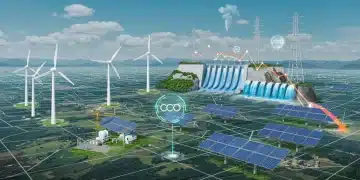Insights on renewable energy expansion: A guide to benefits

Anúncios
Insights on renewable energy expansion highlight its benefits for businesses and communities, including cost savings, job creation, and positive environmental impact while facing challenges like infrastructure limitations and energy intermittency.
Insights on renewable energy expansion are becoming increasingly vital for understanding our planet’s future. Have you ever wondered how these changes might affect your life or business? Let’s dive into the details that make this transformation so crucial.
Anúncios
The importance of renewable energy
Understanding the importance of renewable energy is essential in today’s world. As we face the challenges of climate change and dwindling resources, focusing on sustainable energy sources becomes more pressing than ever.
Why Renewable Energy Matters
Renewable energy offers numerous benefits for our planet and society. It helps reduce greenhouse gas emissions, ensuring a cleaner environment. Moreover, investing in these energy sources contributes to energy security, as they reduce reliance on imported fossil fuels.
Anúncios
Key Benefits:
- Lower carbon footprint
- Job creation in green sectors
- Improved public health due to better air quality
- Long-term economic savings
Additionally, renewable energy helps diversify energy supplies, making systems more resilient and less vulnerable to price fluctuations. With sources like solar, wind, and hydroelectric power, communities can generate their own energy while supporting local economies.
Transitioning to renewable energy also aligns with global commitments to combat climate change. Countries are increasingly adopting policies to encourage clean energy technologies, spurring innovation and development in this space. This transition not only benefits the environment but also presents economic opportunities and technological advancements.
Overall, the importance of renewable energy cannot be overstated. By embracing these technologies, we pave the way for a sustainable future that prioritizes both our planet and economic growth.
Key trends shaping renewable energy expansion

Several key trends shaping renewable energy expansion are transforming the way we produce and consume energy. As technology advances and awareness increases, the drive towards sustainability becomes inevitable.
Technological Advancements
Innovations in technology are at the forefront of renewable energy growth. Breakthroughs in solar panel efficiency and wind turbine design have made these energy sources more affordable and effective. For example, improvements in energy storage, like batteries, allow for better management of energy supply, making renewables more reliable.
Increased Investment
Another significant trend is the surge in investment from both public and private sectors. As companies recognize the long-term benefits of renewable energy, they are committing substantial resources to develop solar and wind projects. This influx of funding drives competition, leading to lower costs and more innovation.
Policy Support and Regulation
Government policies play a critical role in accelerating renewable energy adoption. Incentives, such as tax credits and subsidies, encourage businesses and consumers to switch to cleaner options. Many countries have set ambitious targets for renewable energy usage, creating a framework that supports its expansion.
The growing demand for cleaner energy is also influenced by public opinion and consumer awareness. More people are becoming conscious of their carbon footprints and are choosing renewable sources when available. This shift in consumer behavior is pushing companies to adapt and invest in greener technologies.
As we look to the future, the combination of technological advancements, increased investment, supportive policies, and consumer demand will continue to propel the renewable energy sector forward. Staying informed about these trends is essential for anyone looking to participate in or understand the energy landscape.
Benefits for businesses and communities
The benefits for businesses and communities embracing renewable energy are both numerous and impactful. By focusing on sustainable energy sources, organizations not only contribute to a healthier planet but also enhance their bottom line.
Cost Savings
One of the most significant advantages is cost savings. Transitioning to renewable energy can lead to lower utility bills over time. Solar panels and wind turbines provide a long-term solution by reducing reliance on fluctuating energy prices. Businesses can secure their energy future and improve profitability by investing in these technologies.
Enhanced Reputation
Moreover, adopting renewable energy boosts a company’s reputation. Customers today increasingly value environmental responsibility. By showcasing a commitment to sustainability, businesses can attract eco-conscious customers and stand out in competitive markets. This alignment with consumer preferences can lead to increased loyalty and sales.
Job Creation
Communities also experience growth through job creation in the renewable energy sector. As more companies invest in clean energy, they create new jobs in installation, maintenance, and technology development. This shift not only strengthens local economies but also builds a skilled workforce focused on sustainable practices.
Furthermore, renewable energy projects often lead to improved public health. By reducing fossil fuel emissions, air quality improves, which can lower healthcare costs and enhance the overall quality of life. This benefit is especially crucial in urban areas, where pollution is commonly higher.
In summary, the benefits for businesses and communities from renewable energy adoption are extensive. From financial savings to reputational advantages and job creation, the impact is profound and far-reaching. Communities that embrace these changes can thrive economically and socially.
Challenges and future outlook for renewable energy

The challenges and future outlook for renewable energy are critical as the world shifts toward sustainability. While there are many benefits, we must also understand the obstacles that can impede progress.
Infrastructure Limitations
One major challenge is the existing energy infrastructure. Many regions still rely heavily on fossil fuels, which makes it difficult to integrate renewable energy sources. Upgrading the grid to handle energy from solar and wind is a complicated and expensive process.
Intermittency Issues
Another issue is the intermittency of renewable sources. Solar and wind energy depend on weather conditions, so there are times when they cannot produce sufficient energy. To ensure a steady supply, we need advanced storage solutions, such as batteries, to store excess energy for cloudy or calm days.
Policy and Regulation
Policy and regulatory challenges also play a significant role in the future of renewable energy. Inconsistent laws and regulations can hinder investment and growth in clean energy projects. Stability in policies is essential for businesses to plan and invest in renewable energy technologies.
Despite these challenges, the future outlook for renewable energy remains positive. Technology continues to evolve, making it easier to capture and store renewable energy. For instance, innovative battery technologies are emerging that promise to improve energy storage capacity and efficiency.
Furthermore, as public awareness of climate change grows, more individuals and organizations are advocating for renewable energy. This social push encourages governments to create more favorable policies, thus boosting the industry.
In conclusion, while challenges exist in the journey toward a fully renewable energy future, the prospects for overcoming these hurdles are encouraging. With continued innovation, investment, and supportive policies, the renewable energy sector is poised for significant growth.
FAQ – Frequently Asked Questions about Renewable Energy
What are the main benefits of renewable energy for businesses?
Renewable energy can significantly lower energy costs, enhance reputation among consumers, and create job opportunities in the community.
How does renewable energy impact the environment?
Renewable energy reduces greenhouse gas emissions, improves air quality, and helps combat climate change, leading to a healthier planet.
What are the common challenges facing renewable energy expansion?
Challenges include infrastructure limitations, intermittency of energy supply, and inconsistent policies that can hinder investment.
What technological advancements are aiding renewable energy growth?
Breakthroughs in energy storage, solar panel efficiency, and wind turbine design are making renewable energy more effective and affordable.





